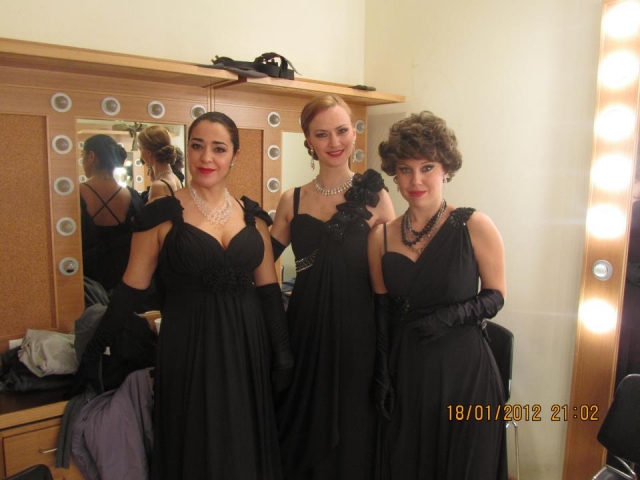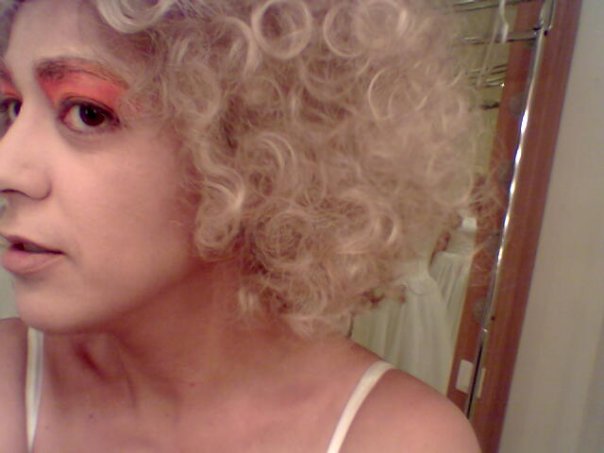Personal archive of Mireille Ivanova
Anastasia Balezdrova
The words belong to Mireille Ivanova, a young woman of mixed Bulgarian - Greek origin and soprano at the opera in Athens. I heard her for the first time during a concert dedicated to the Day of the Bulgarian Revival Leaders. On this occasion, she had chosen to perform "Aria of Zornitca" from Parashkev Hadjiev’s opera "Crazy Gigya" and Dobri Hristov’s song "Loukovit girls". The combination of lyrical variations and folk motifs perfectly fitted her voice that was skilfully following a variety of high tones.
Mireille was born in Sofia, moved with her family to Greece but music had brought her back to Bulgaria to complete her education. There she performed in opera productions for the first time, before her final return to Athens in 2006. Today she works at the opera in Athens.
Mireille and music
My mother was a Greek political emigrant in Bulgaria. She was one of the children who the leftists had sent to the socialist countries. I found myself in Greece when I was 12 years old. My mother had the opportunity of repatriation and so my parents decided to move the family here.

I have had a liking for music since I was a child. I started to play piano when I was 7-8 years old and took private lessons at home. This continued until the moment we moved to Greece where the environment was quite different and my parents had to start their lives from scratch. So, the first few years I was playing the piano at home, on my own, as I could not take lessons. Shortly thereafter, however, I started going to courses organized at the municipality and later, when things returned to normal, I started attending a music school.
Opera singing
I am one of those people who are being told, "Girl, you are late in starting." My first contact with classical singing was when I was 17 years old. A year later I stopped because I turned to medicine. Both my parents were working in this sector and they directed me to it. So I became a nurse and left music aside.
I found, however, that this was not what I wanted to do as I was under stress. I returned to music, but this time I indulged in it because I was 23 years old and had to make up for lost time.
My parents’ friend, who was a great music lover and loved to hear me singing and playing, directed me to Bulgaria. She introduced me to musicians whom she knew and, with their help, I was able to reach the opera educators and graduate from the conservatoire in Sofia. Gradually I began to participate in small shows to gain experience and, when I graduated and had no commitment to attend lectures, I devoted myself entirely to singing. I went on tours in many countries in Western Europe.

In 2006, I returned to Greece because my child was born then. Gradually I began to restore ties with the music community here and to participate in small concerts. Therefore, I ended up at an audition at the opera in Athens. They liked me, and from 2009 to 2012, I took part in separate productions that needed a larger number of participants and in smaller private opera performances in parallel, thus being able to participate in the operas "Rigoletto" and "Il Trovatore". Since last year, I have been a staff member of the opera. At the same time, however, I go to different auditions when there are opportunities for soloist performances.
A day in the life of opera singers
We also follow a programme, it just changes frequently and this is the difference from other professions. When we have no performances we are free. This however does not mean that you do not work on your voice and singing at home. I often want to have a few days off to focus on singing at home and on other things that I am exploring. What is interesting in music is that there is always something new to learn.
The rehearsals for a particular show start 2-3 months before the show itself, followed by setups, which are longer in terms of time. The duration of the performances is about 3 hours and we go at least an hour earlier, depending on how long it takes to get dressed and do the make-up.

Stage fright in my case means nervousness before I get on stage. Then that feeling disappears. I can say that I have largely overcome it. Of course, it depends on how prepared I feel.
The phenomenon of Bulgarian voices
My talent comes more from the Bulgarian side, as my mother, despite her love for and, knowledge of, music, was not good at singing.
The path to the opera technique was not easy for me because I did not find from the beginning a teacher whom I could trust. It was not easy for the teachers to direct me to the appropriate repertoire because of the specificity of my voice. It can go down from very high tones, but it is medium deep-toned as well. I am not the type of singer like Gena Dimitrova. She was a purely dramatic soprano while I am probably a dramatic coloratura. This term is used for flexible voices that are suitable for high-lying velocity passages. The definition "dramatic" relates to their deepness and range. My voice is more demanded because it is more specific and rarer.
The range of the majority of the Bulgarian voices is quite large and warm. I think the difference from the others lies precisely in this.
The audience in Bulgaria and Greece